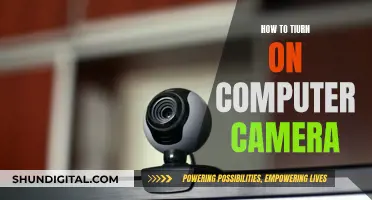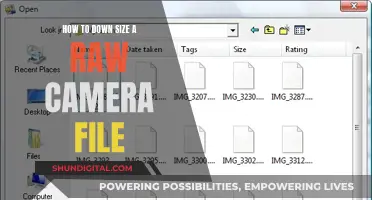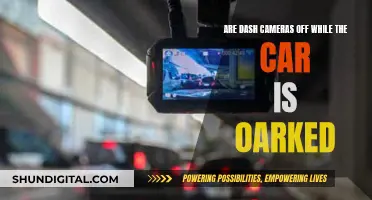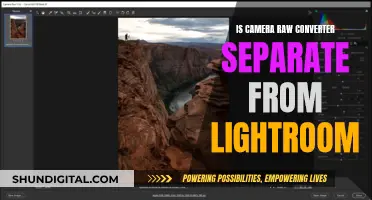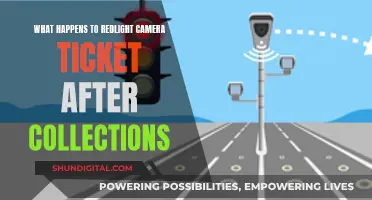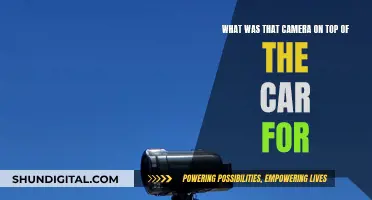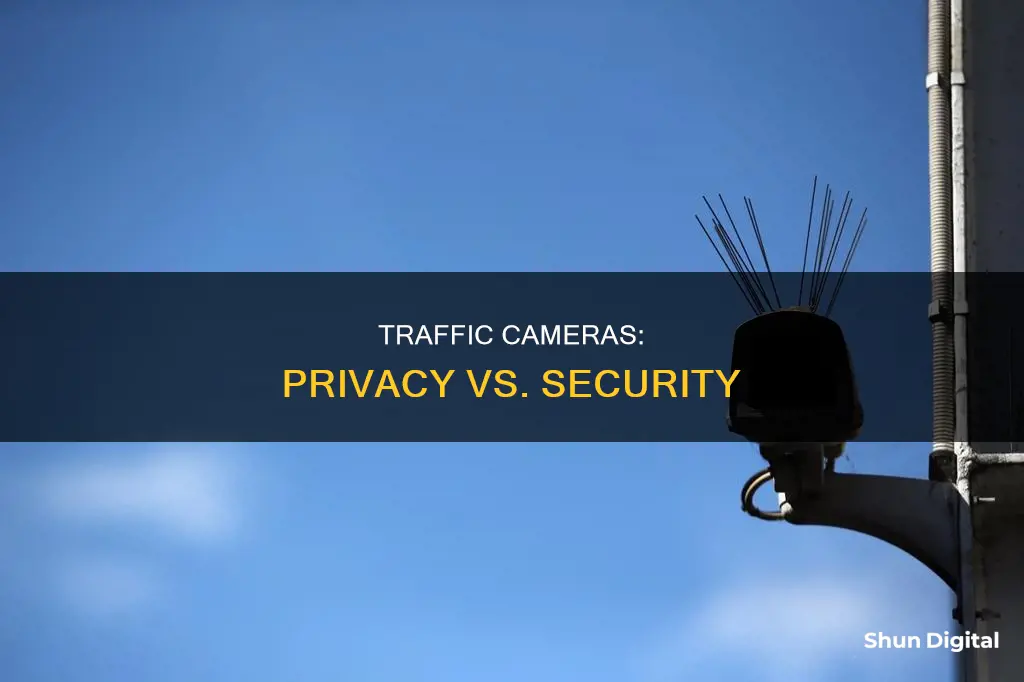
The use of traffic cameras to enforce road rules and issue fines is a controversial issue, with questions arising about their constitutionality. Traffic cameras are used in at least 24 states to monitor and enforce speeding, failure to stop, and red-light violations. While some argue that these cameras improve road safety and generate revenue for local communities, others claim that they infringe on constitutional rights, due process, and equal protection. The debate centres around the validity of the evidence provided by these cameras and the fairness of the fine collection process, which often lacks proper appeal procedures.
| Characteristics | Values |
|---|---|
| Constitutionality | Dubious |
| Violation of Rights | Sixth Amendment, Due Process, Equal Protection Clause of the Fourteenth Amendment |
| Arguments For | Increased safety, reduction in accidents |
| Arguments Against | Intrusion into daily life, difficult enforcement and collection of fines |
| Studies | Mixed results, independent studies show no gains or worse results |
| Public Opinion | Unpopular, voters have opposed cameras by an average margin of 63% |
What You'll Learn

Violation of the Sixth Amendment's Confrontation Clause
The Sixth Amendment to the U.S. Constitution, also known as the Confrontation Clause, grants criminal defendants the right to be confronted with the witnesses against them. This is a cornerstone of due process rights in the Western legal tradition, allowing defendants to face and cross-examine their accusers.
The use of automated photo enforcement, such as red-light and speed cameras, has sparked debates about the Sixth Amendment. The issue arises because cameras, unlike human witnesses, cannot be confronted or cross-examined. There is no one to testify about the circumstances of the alleged violation or explain how the camera "evidence" was obtained, analysed, or transmitted. This raises concerns about the admissibility and reliability of camera-based evidence in court proceedings.
In 2010, the Superior Court of California ruled that camera-based data was inadmissible as evidence because no one with firsthand knowledge of how the data was generated or processed was present in court to testify or be cross-examined. Similarly, the California Court of Appeal ruled that camera evidence was insufficient to convict a driver without a technician present to testify about the analysis of the evidence. These decisions highlight the importance of the Confrontation Clause in challenging camera-based traffic citations.
However, there have also been conflicting rulings. In Williams v. Illinois, the U.S. Supreme Court allowed DNA information to be admitted into evidence without the testimony of the analysing technician, potentially weakening the Confrontation Clause's applicability in camera-based cases. Nonetheless, critics argue that traffic camera cases differ from more serious crimes involving complex evidence, as the camera-produced information is often the sole evidence.
The debate surrounding the Confrontation Clause and traffic cameras underscores the tension between technological advancements in law enforcement and traditional legal protections. While camera evidence may provide convenience and additional data, it also raises questions about constitutional rights, due process, and the role of technology in the justice system.
Understanding RAW Photography: Does Your Camera Support It?
You may want to see also

Due process and equal protection
Traffic enforcement cameras are typically mounted beside or over a road or installed in an enforcement vehicle to detect and capture evidence of motoring offenses, such as speeding, running red lights, or unauthorized use of bus lanes. While these cameras have been shown to effectively reduce accidents and injuries, their use has also raised questions about their legality and potential infringement on constitutional rights, particularly regarding due process and equal protection.
Due process, as outlined in the Fourteenth Amendment of the US Constitution, guarantees individuals the right to fair and legal treatment in legal and administrative proceedings. In the context of traffic cameras, due process concerns arise when individuals receive violation tickets generated by these cameras. For example, a plaintiff in a case against a New York county traffic enforcement agency argued that receiving a red light camera violation and being subjected to a fine without clear evidence of the driver's identity violated their right to due process. However, the suit was dismissed, as the court found that the right to be free from a traffic ticket fine did not fall under the specific and fundamental rights protected by the Due Process Clause.
Another aspect of due process relates to the use of private contractors in operating traffic cameras and issuing tickets. In some cases, private contractors are paid based on the number of tickets they issue, creating a potential conflict of interest. This was evident in San Diego, where pictures from red-light camera systems were ruled inadmissible in court due to a "total lack of oversight" and the "method of compensation." Additionally, the use of automated systems and cameras without human oversight can lead to errors in ticketing, as seen in Baltimore, where cameras produced erroneous speed readings, resulting in incorrect citations.
Equal protection, also guaranteed by the Fourteenth Amendment, ensures that similar individuals are treated similarly by the law. In the context of traffic cameras, equal protection concerns may arise when certain groups or individuals are disproportionately impacted by traffic camera enforcement. For instance, low-income communities or communities of color may bear the brunt of excessive ticketing and fines, exacerbating existing social and economic inequalities.
Furthermore, the use of traffic cameras has been criticized for potentially infringing on privacy rights and enabling mass surveillance of vehicle movements, which can indirectly track the movements of vehicle owners. While a case brought to the European Court of Human Rights found that human rights were not being breached, groups like the American Civil Liberties Union argue that the common use of speed traps as a revenue source undermines the legitimacy of safety efforts.
In summary, the use of traffic enforcement cameras has sparked debates about due process and equal protection under the law. While courts have generally upheld the constitutionality of traffic cameras, concerns remain about their potential impact on individual rights, fairness in enforcement, and the role of private contractors in issuing citations.
Reviving Camera Batteries: Simple Tricks to Try
You may want to see also

Safety vs revenue
Traffic cameras have become a contentious issue in recent years, with debates raging across the country regarding their constitutionality and their purpose. The primary arguments for and against traffic cameras centre on safety and revenue.
Safety
Those in favour of traffic cameras point to the fact that they provide an effective way to enforce traffic laws and improve road safety. Studies have shown that traffic cameras lead to a reduction in accidents and fatalities. For example, a worldwide review of studies found that speed cameras led to an 11% to 44% reduction in fatal and serious injury crashes. Additionally, traffic cameras can free up police resources, allowing them to focus on other important tasks.
Revenue
Critics of traffic cameras, on the other hand, argue that they are primarily a revenue-generating tool for local governments. They claim that the implementation of these cameras is a way for cities and counties to issue extra citations and make up for budget shortfalls. This is particularly frustrating for those who receive tickets, which can be difficult and costly to contest. Furthermore, some argue that the use of traffic cameras reduces the interaction between police and citizens, potentially impacting the ability to detect other crimes or impaired drivers.
While the safety benefits of traffic cameras are clear, the revenue argument cannot be ignored. It is important for municipalities to be transparent about the purpose and impact of these cameras and to ensure that any revenue generated is used responsibly and for the benefit of the community.
Understanding Camera Lenses: Integrated Focus Feature Explained
You may want to see also

Constitutional rights and yellow light timing
The use of traffic cameras has been a topic of debate for years, with some arguing that they are an effective way to improve road safety, while others claim that they are a violation of constitutional rights and an invasion of privacy. This discussion has centred around the Sixth Amendment's Confrontation Clause and the right to due process.
In the United States, red-light cameras are used in 24 to 26 states, and their use has been the subject of numerous court cases and voter referendums. While some states have prohibited their use, others, like California, have upheld their constitutionality. A 2014 California Supreme Court ruling stated that images taken by red-light cameras are admissible as evidence in court and can be used to prove traffic violations.
However, critics argue that the use of these cameras could violate the Sixth Amendment's Confrontation Clause, which grants criminal defendants the right to confront their accusers. Since a camera, not a person, is the witness to the offence, and the ticket is issued to the owner of the vehicle, not the driver, the violation is typically treated as a civil fine rather than a criminal offence. This can make enforcement and collection difficult, and can deny drivers their day in court.
In addition to the constitutional concerns, there are also questions about the effectiveness of red-light cameras in improving road safety. While some studies have shown a decrease in accidents and violations, others have found an increase in rear-end collisions due to sudden stops. There are also concerns about the financial incentives for local governments and camera companies, who may shorten yellow light timings to catch more red-light runners and generate more revenue.
In a due process lawsuit against a New York county traffic enforcement agency, the plaintiff argued that the use of red-light cameras violated the Due Process and Equal Protection Clauses of the Fourteenth Amendment. The suit was dismissed, with the court finding that freedom from a red-light ticket fine did not fall under the specific and fundamental rights protected by the Constitution.
The debate over the constitutionality and effectiveness of yellow light timing and red-light cameras continues, with ongoing research and legal challenges. While some argue that these measures improve road safety, others believe they infringe on constitutional rights and are used primarily for financial gain.
Note 5 Camera: Features Beyond Standard Modes
You may want to see also

Unconstitutional fines and driver's license renewal
Traffic cameras are a contentious issue in the US, with some arguing that they are an important safety measure, while others claim they are simply a way for local governments to increase revenue through fines. While there have been legal challenges to the use of traffic cameras on constitutional grounds, these have generally been unsuccessful, with courts finding that the right to be free from traffic tickets does not fall under the specific and fundamental rights protected by the US Constitution.
However, the use of traffic cameras and the resulting fines have highlighted a larger issue: the suspension of driver's licenses for unpaid fines. This practice has been deemed unconstitutional by some legal experts and advocates, who argue that it disproportionately affects low-income individuals and communities of color, effectively criminalizing poverty.
Unconstitutional Fines and Drivers License Renewal
The suspension of driver's licenses for unpaid fines, including traffic camera tickets, has been a common practice in the US, with over half of all states employing some form of debt-based license restrictions. These restrictions have had significant negative consequences for those who are unable to pay their fines, often making it difficult to carry out essential daily tasks such as commuting to work, taking children to school, or accessing healthcare and groceries. This has led to a cycle of unemployment and further inability to pay outstanding debts, pushing individuals further into the criminal justice system.
The impact of these license suspensions is felt disproportionately by low-income communities and communities of color. In an analysis by the ACLU in Ohio, for example, it was found that the high police presence in low-income urban areas resulted in a higher rate of traffic stops and subsequent license suspensions for unpaid fines in these communities. This has led to increased fines, arrests, and incarceration for driving with a suspended license, exacerbating the issues of poverty and unemployment.
Reform Efforts and Legislative Action
Recognizing the negative impacts of debt-based license suspensions, a growing number of states have taken steps to reform or abolish these practices. Since 2017, 25 states and Washington, D.C. have passed reforms to curb debt-based driving restrictions, and more states are expected to follow suit in the coming years. These reforms include legislative changes, such as ending the suspension of licenses for unpaid traffic tickets and providing payment plans or amnesty programs for those with outstanding fines.
In addition to legislative reform, there have also been successful legal challenges to debt-based license suspension schemes on constitutional grounds. Courts in several states, including Tennessee, Virginia, and Michigan, have found that these practices violate the Equal Protection and Due Process Clauses of the Fourteenth Amendment. These courts have argued that the suspension of licenses without regard for an individual's ability to pay amounts to "punishing a person for their poverty," which is not a legitimate government objective.
The issue of unconstitutional fines and driver's license renewal is a complex and ongoing debate in the US. While there have been significant reforms and legal challenges to debt-based license suspension practices, there are still many states that employ these schemes, continuing to disproportionately affect low-income individuals and communities of color. Further legislative and advocacy efforts are needed to ensure that poverty does not determine an individual's freedom to drive and that driving privileges are reserved for addressing dangerous driving rather than coercing debt payment.
Surveillance Cameras in Schools: Are Students Being Watched?
You may want to see also
Frequently asked questions
The use of traffic cameras has been challenged in courts on constitutional grounds, but the right to be free from a traffic ticket does not fall under the specific and fundamental rights protected by the US Constitution and substantive due process. However, the use of these cameras could violate the Sixth Amendment's Confrontation Clause, which grants criminal defendants the right to face their accusers.
Proponents of traffic cameras argue that they improve road safety and reduce accidents. They also provide a new source of revenue for local governments, which can be used to benefit communities.
Critics argue that traffic cameras are an invasion of privacy and a violation of constitutional rights, including due process. The financial incentives for local governments and camera companies can also create a conflict of interest, leading to a lack of trust in government.
In most places, traffic camera citations are treated as civil fines rather than criminal offenses. This means that offenders often don't have the right to a day in court and must pay the fine to renew their driver's license or auto registration.


